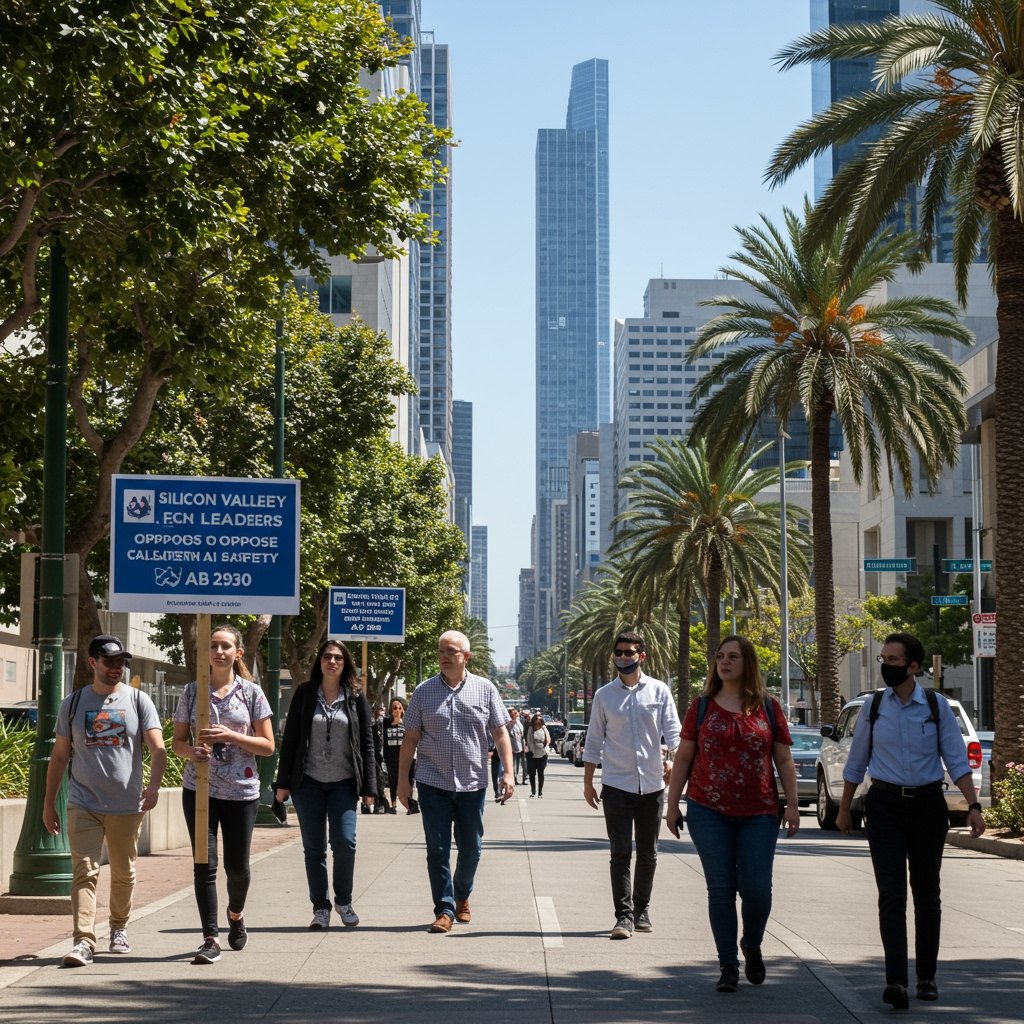Tech Giants Push Back Against Proposed California AI Safety Rules
Sacramento, CA – A significant confrontation is brewing between California lawmakers seeking to regulate artificial intelligence and the tech industry giants that are at the forefront of its development. Following the California Assembly Privacy and Consumer Protection Committee’s decision to advance Assembly Bill 2930 on March 22nd, a coalition of prominent Silicon Valley technology executives and venture capitalists publicly announced their organized opposition just two days later, on March 24th.
The newly formed group, operating under the name “Cal Innovate Forward,” represents a powerful assembly of interests from across the artificial intelligence landscape and the investment community that fuels it. Its membership includes leading figures from cutting-edge AI research labs and deployment companies, such as OpenAI and Google DeepMind, alongside influential venture capital firms deeply invested in the tech sector’s future, specifically naming firms like Sequoia Capital and Andreessen Horowitz as participants. The coalition’s rapid formation and public statement underscore the industry’s alarm regarding the potential impacts of AB 2930 as it currently stands.
AB 2930, carried by Assemblymember Buffy Wicks (D-Oakland), is one of several legislative efforts nationwide aiming to establish guardrails around the rapidly evolving field of artificial intelligence. The bill, as it progressed through the Assembly committee, seeks to impose stringent requirements on developers of certain high-impact AI models, particularly those deemed capable of posing significant risks. Proponents argue such regulation is necessary to protect the public from potential harms ranging from bias and discrimination to more speculative existential risks associated with advanced AI systems. The bill’s advancement on March 22nd signaled a serious legislative intent to move forward with regulatory frameworks, prompting the swift and coordinated industry response.
Cal Innovate Forward’s primary contention is that the bill’s proposed requirements, while perhaps well-intentioned, are overly broad, potentially unworkable in practice, and could have detrimental consequences for California’s standing as a global leader in AI innovation. They argue that the legislation’s stringent provisions, particularly concerning liability and mandatory safety testing before deployment, could inadvertently stifle the very innovation it seeks to govern responsibly.
Concerns Over Innovation and Economic Impact
A core argument advanced by the coalition is that the rigorous requirements mandated by AB 2930 could significantly slow down the pace of AI development and deployment in California. The tech industry operates on rapid iteration and continuous improvement. Imposing extensive, government-mandated testing and compliance hurdles on every significant model update or deployment could create bureaucratic delays, hinder research velocity, and make it difficult for California-based companies to compete with entities in jurisdictions with less burdensome regulatory environments.
Furthermore, the coalition voices serious concerns that the bill’s provisions could incentivize AI companies, including both established players and burgeoning startups, to relocate their operations, research, and development efforts outside of California. This potential “AI brain drain” could erode the state’s tax base, diminish its pool of highly skilled talent, and cede its leadership position in a technology widely seen as the next major economic and societal transformation. For venture capital firms like Sequoia Capital and Andreessen Horowitz, the viability and growth potential of their portfolio companies, many of which are deeply involved in AI, are directly linked to the regulatory climate.
Dissecting Liability and Testing Provisions
Two specific areas of AB 2930 drawing particularly sharp criticism from Cal Innovate Forward are the proposed liability framework and the mandatory safety testing standards. The coalition argues that assigning legal liability for the outputs or impacts of complex, rapidly evolving AI models is extraordinarily challenging and could place an unreasonable burden on developers. They contend that the behavior of advanced AI can be difficult to predict entirely in all possible scenarios, and holding developers strictly liable for unforeseen outcomes could create a chilling effect on innovation, discouraging the development of potentially beneficial, albeit complex, systems.
Regarding mandatory pre-deployment safety testing, the industry group questions the practicality and efficacy of defining and implementing universal testing standards for diverse and rapidly advancing AI models. They argue that what constitutes “safe” or “unsafe” can be context-dependent and that rigid, mandated testing regimes may not capture the nuances of real-world deployment or could quickly become outdated given the pace of AI development. They advocate for more flexible, industry-led safety practices or performance-based regulations rather than prescriptive, one-size-fits-all testing requirements that they fear could become bottlenecks.
Lobbying Effort Commences in Sacramento
In light of these concerns, Cal Innovate Forward has announced plans to launch a significant and coordinated lobbying effort and public awareness campaign in Sacramento. This push is set to unfold “over the next month,” indicating a focused and intensive period of engagement targeting state legislators and policymakers. The objective of this campaign is clear: to urge substantial amendments to AB 2930 that would address their concerns regarding innovation, economic impact, liability, and testing, or, failing that, to secure the bill’s defeat before it has the opportunity to reach the full Assembly floor for a vote.
Industry representatives associated with the coalition have been careful to state that their opposition to AB 2930 does not equate to an opposition to responsible AI development or necessary safety measures. Instead, they frame their stance as a disagreement with the specific approach taken by the current version of the legislation, which they believe is overly broad, potentially counterproductive, and not adequately tailored to the realities of AI development and deployment. They emphasize a desire to work with lawmakers but suggest that the current bill, advanced on March 22nd, risks undermining California’s global leadership role in a critical technological field.
The coming weeks in Sacramento are poised to be a battleground of competing visions for the future of AI regulation. As Cal Innovate Forward brings its considerable resources and influence to bear, legislators will weigh the industry’s concerns against the public interest in ensuring the safety and trustworthiness of artificial intelligence systems, setting a potentially precedent-setting course for California and beyond.



















